
‘@Play‘ is a frequently-appearing column which discusses the history, present, and future of the roguelike dungeon exploring genre.
This is @Play #89. We resume our examination of 1995’s post-apocalyptic DOS roguelike, Alphaman! If you missed it, don’t forget to check out part one!
Checking Berries and Inspecting Gadgets
I’m an outspoken fan of interesting identification systems in roguelikes. You’re free to disagree with me, but I find that they add a layer of strategy to the use of items. In many games, when you randomly find a good item, it makes sense to immediately press it into service. Often there is no skill in its use; you use, wear or wield it, and from then on its powers are at your disposal. At its furtherest extreme it’s like the random number generator is playing you. There should be some decision-making involved to properly utilize the item once it’s found. Maybe items have limited durability that has to be managed? Maybe items change over time, so you must know when best to use them? Or, as with Rogue and Hack, maybe you don’t know what many items are at first, and must figure that out through some risky and costly manner.
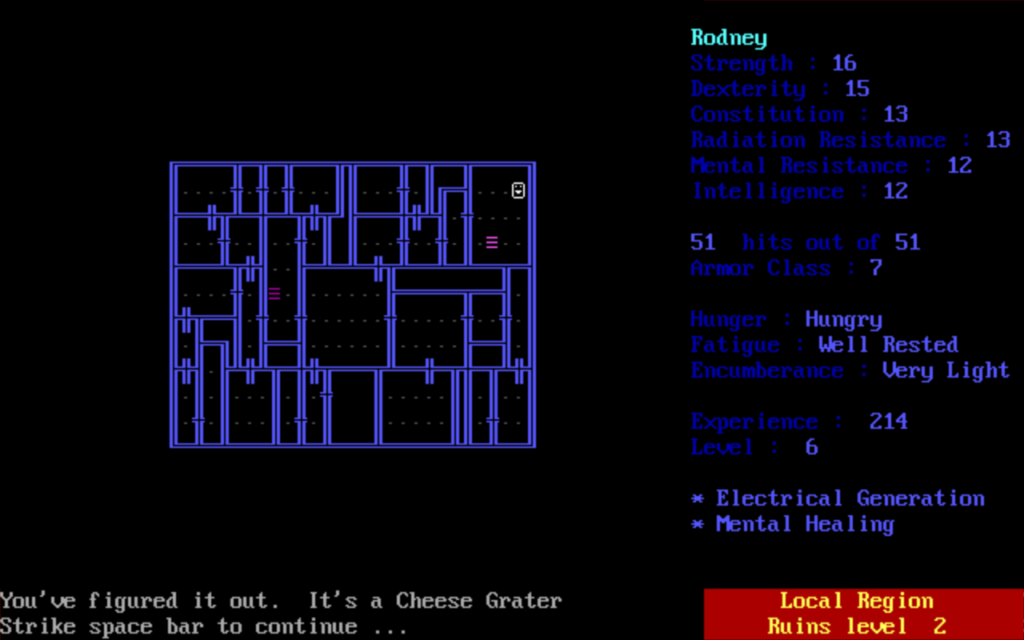
Alphaman uses an identification system, but it works differently from Rogue’s. While there are items that can identify other items, for the most part you don’t identify things like that. There are two major classes of unknown items in Alphaman: berries and devices.
Berries are somewhat like Rogue’s potions. They’re one-use items that are generally consumed to activate. Alphaman has 35 kinds of randomized berries to discover on each play. While the game gives you insight into a few berries at the start of the game, most berries must be discovered by testing them. Like Rogue’s potions, there are good and bad berries, and like in Rogue, once you know the function of one variety of berry, you know it for all other berries of that type. Good-type berries might heal you, restore your fatigue, permanently increase your defense, or help you figure out how to use gadgets. Bad ones could poison you, cause you to grow useless extra limbs or blind you. And then there are the interesting cases, the berries that could be either bad or good, depending on its color. Most berry effects are temporary, although some, like the berry of blindness, last a significant number of turns.
An important thing to keep in mind about berries: known berries are marked with an asterisk, but their descriptions don’t change in-game. You must check your known items list to find out what a berry does. Flipping between the inventory and the discovered items list does get annoying after a while.
Alphaman’s innovation with berries is giving each a ripeness level. All berries have a color that tells you how ripe it is. The colors go through the spectrum, from red (least ripe) to purple (most ripe). Ripeness is kind of like the curse/bless system of NetHack, but all berries naturally become riper over time. More ripe berries are more powerful than less ripe ones.
You will probably have to consume some berries to identify them. If it’s a bad berry, you want to identify it by eating it unripe. If it’s a good berry, you want it to be ripe to maximize its effects. But some berries give bad effects when unripe and good effects when ripe. That’s especially the case for stat and experience effecting berries, which are very helpful when eaten when ripe. A few berries are also better off thrown at enemies than eaten yourself. Decisions, decisions.
Gadgets are also divided into two classes, small and large. There are 97 types of small device and 38 of large. Fortunately you don’t have to use-identify them! There is a command, F, to figure out how to use a device. You aren’t guaranteed to be successful, and if you fail your chance very badly you could break the device, or, if it’s a grenade-type item, cause it to go off in your hands.
Many kinds of gadgets are humorous, and some are useless, but a few apparently-extraneous ones have a secret function that can be discovered if you experiment with them. Like, a microwave oven can ripen berries, and toilet paper can be used as a weapon against dung beetles. Try using items, with the U key, to see what they do. A handful of items can also be “Unused,” with Shift-U: this is usually used to un-equip wearables, but that’s also how you get things out of a Backpack item.
Mutations and Fatigue
Two unique characteristics of Alphaman are the way it handles mutations, and its fatigue system.
Mutations are in other roguelike games, of course. They’re important elements of both ADOM and Dungeon Crawl Stone Soup. Alphaman uses them as an extra couple of perks your character receives upon creation. Unlike many other games, starting an Alphaman character is very quick: you get basic stats in a number of D&D-like categories, and are randomly assigned one Physical and one Mental mutation. You don’t gain more mutations as a character progresses. The ones they begin with are the only mutations they’ll have through the whole game.
Mutations are used the same way as items, with the U key, for “Use.” Most of them have a short delay before you can use them again. All of these mutations are beneficial, but you don’t get any say in what you get, other than by start-scumming, quitting and restarting many times until you get your favorites. Some mutations immediately increase one of those middling starting stats up to epic levels. Most mutations are very helpful if you know how to use them correctly, but figuring out the best way to use them might take a few games. I especially found the Quills mutation, which gives you an innate missile weapon you can use in a pinch and directly damages monsters who attack you in melee.
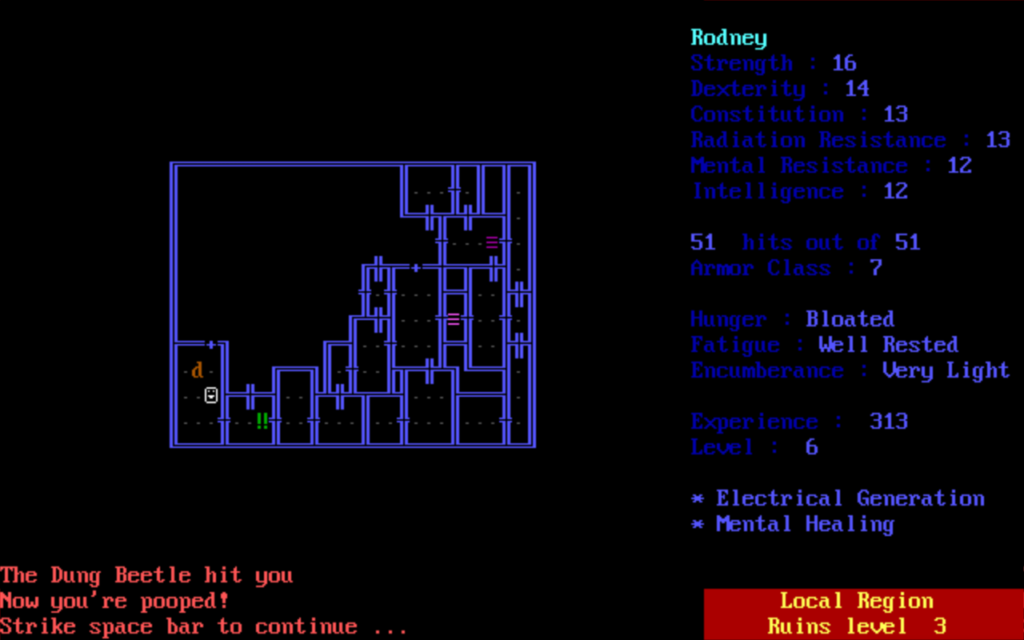
Fatigue is a very interesting addition to the roguelike formula, in my opinion. Every action you undertake carries with it a cost in energy, which comes out of your fatigue level. Fatigue is shown on screen by a status that runs from Well Rested down through Pooped, and eventually Exhausted. Your actions become less effective as your fatigue rises. If this sounds burdensome, it needn’t be. It doesn’t take very much to restore your fatigue level. All you generally need to do is rest a few turns, with the period key, to get your level back up from Pooped to Well Rested.
What fatigue does is impose a limit on doing many things in close succession. Fighting large numbers of enemies at once, even if they’re attacked one at a time, will tire you out a lot. If you’ve being chased by monsters and are a little faster than them, you can probably store enough of your stamina by running until you’re one space away, then resting a turn while they catch up. Carrying a lot of things, measured by your on-screen Encumbrance level, or having a low Constitution stat causes you to become fatigued more easily. But so long as you think to rest a few turns after fights you should be okay.
Spoilers
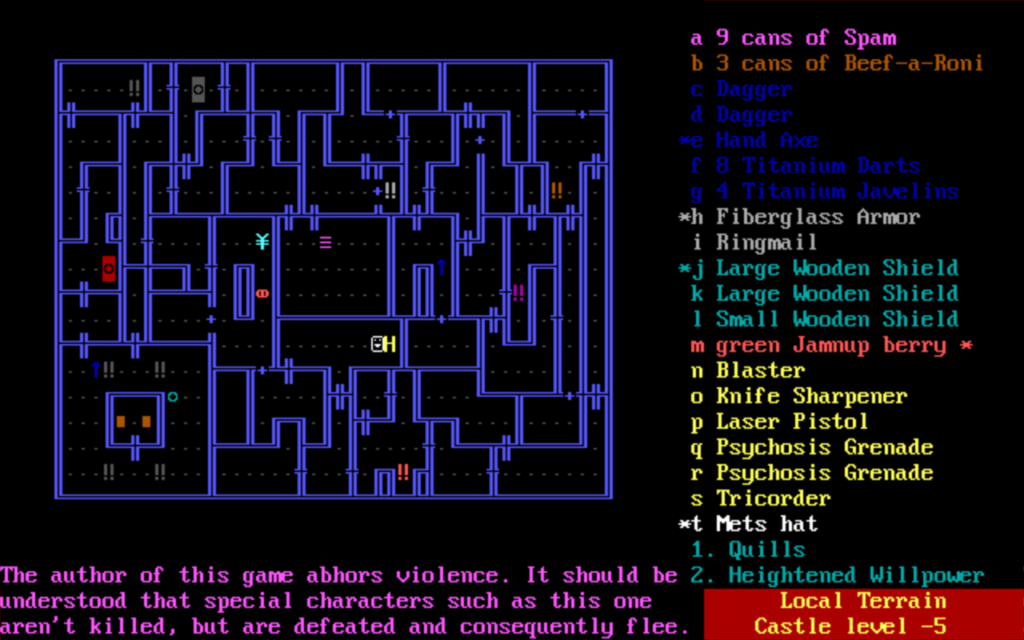
This section is spoilers, but they are the kind that, at this late date, I think will help a player decide whether they want to play this unusual and interesting game more than actually give anything away. Still, if you want to go in completely fresh, you’ll want to skip this section. (I gave a few very minor things away above, but that’s pretty light.)
To win at Alphaman generally requires:
- Finding Elvis’s Hideout, and getting the Blue Suede Shoes from the real Elvis (who is friendly, but won’t give you the shoes until all the Impersonators are defeated). BTW, all of these places are considered “castles” by the game.
- Finding the Munster’s castle, 1313 Mockingbird Lane, which contains a map to reveal the location of the Grinch’s stronghold. The stronghold can be found without the map, though you’ll have to search around for it.
- Finding the Castle of Those Who Came In Second to find Buzz Aldrin’s Space Suit, which confers radiation resistance. The Grinch’s place is always in the middle of a radiation zone, which will rapidly sap your health while you’re within it. It is possible to acquire radiation resistance by other means, so this may be optional.
- Finding Trump’s Casino for the ID card to get into the Grinch’s castle. You’ll easily know the casino—most of the monsters and items found inside it are “Trump” monsters and items, as in, Trump Ghouls, and the Trump Cheese Grater.
- Finding the Castaway’s Fortress to obtain the Keptibora Serum from Gilligan, which provides 24 hours of resistance to the Grinch’s nerve toxin. The Castaway’s Fortress is always surrounded by water, so a means of travel to it must be sought.
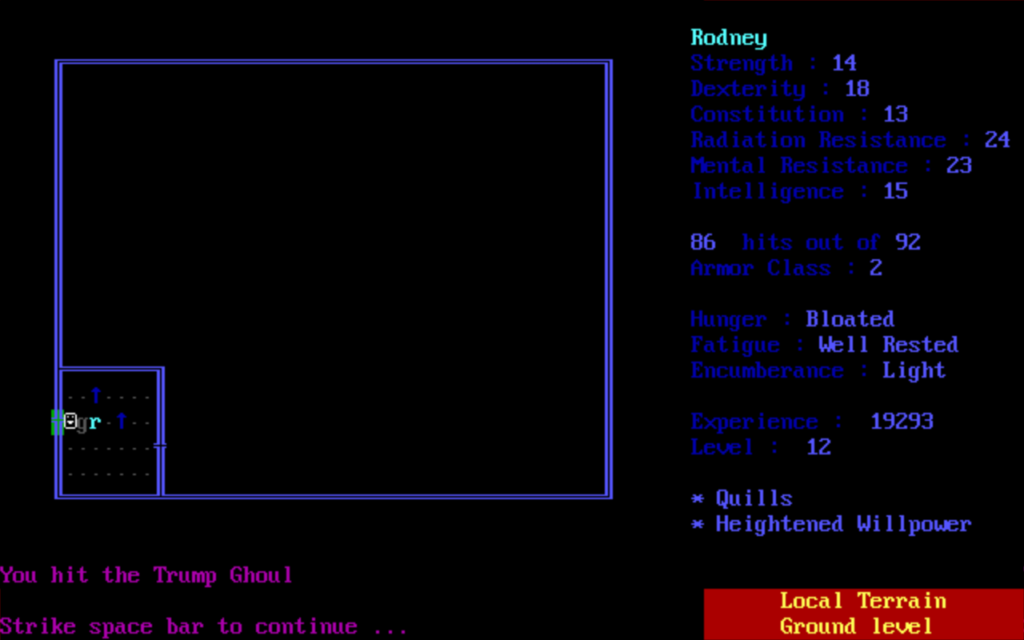
In the roguelike way, each of these steps contains many unexpected perils, and it may take you multiple attempts at each, falling victim to each major obstacle at least once, before you discover the way through. If you have the time, energy, and patience to put up with that, then Alphaman will supply you with many hours enjoyment. The pleasure of this may begin to diminish for you as you die more and more often, however.
You first games are likely to be short, so not much lost, but the further you get, the more you lose when an unexpected danger kills your hapless character. (“It’s a rosebush, how hard could it be?”) One thing that might help you, that’s not a tremendous spoiler, is that the various castles you have to explore can mostly be done in any order.
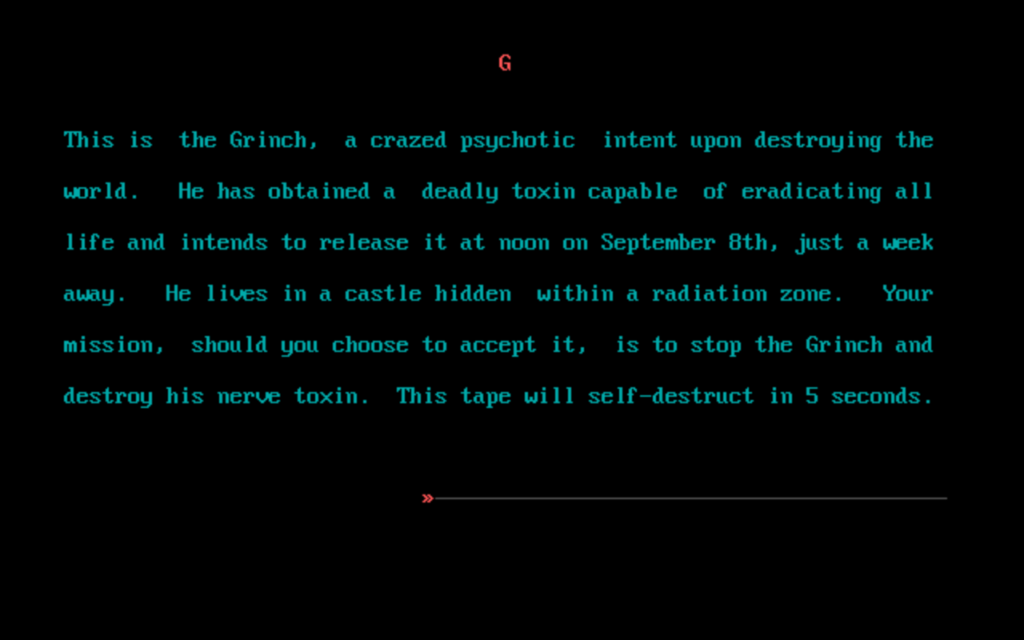
At the very end of the game you’ll face the Grinch, and he has one last nasty surprise for you. I am torn, a bit, about whether to spoil this, but it is in a chapter of spoilers, and it may save you a loss at the very end of your journey. So I will reveal this: Your final task is not to kill the Grinch. Think about who he is, what he came from, look around his castle for significant items, and thing how you might be able to find a way to appeal to his better nature. That’s all.
Alphaman’s Legacy
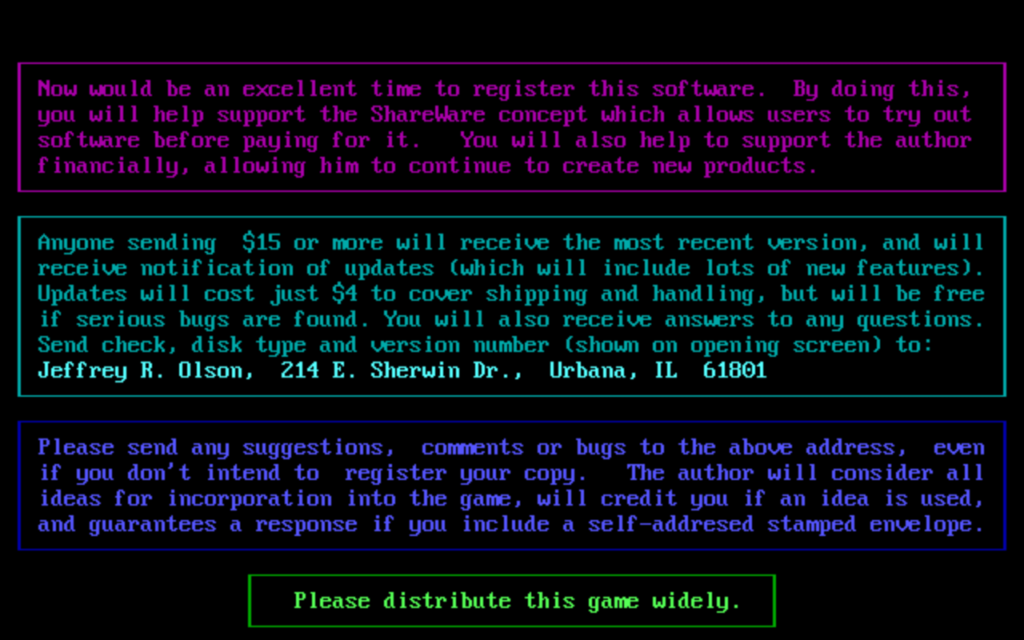
1995 was towards the latter days of the age of shareware. It’s easy to forget, but there were different types of shareware. There was the first-hit’s-free type, the kind that gave out the first episode but where the publishers released the others by mail order or or commercially. That was the model that Wolfenstein 3D and Doom used, and was probably the most successful. Then there’s the kind that lets you play up to a certain point, but to go beyond that you had to pay for a registration code, that unlocked the rest of the game. This often got assigned the moniker of “trialware.” Then there’s what we might call “true” shareware, where the game, in full, was distributed, and while it might nag you to register it, there was no need to to keep playing. If players enjoyed it, they were on the honor system to send in their payment. One of these true shareware games was Alphaman.
Alphaman’s creator Jeffrey Olson tells me he only ever received about 30 paid registrations for his game. At $15 each, that comes up to $450, which given the number of hours he put into it doesn’t seem like proper recompense. Perhaps it’s because of the prevalence of free, sometimes even open source roguelikes like NetHack and Angband, which were already on releases that current-day players would see as reasonably complete. Jeffrey doesn’t harbor any hard feelings, he says, he was just happy to meet people who enjoyed his game.
In the years since its release, Jeffrey has been doing quite a lot with his life! He graduated with a doctorate in Physics from Cornell University. He made hardware that will travel to the planet Jupiter on the Europa Clipper:
“[…]cooling a JPL infrared spectrometer to detect what chemicals are present on Jupiter’s icy moons, and to the asteroid Psyche, cooling a gamma ray spectrometer that will detect what elements are present in the metallic asteroid. I wish I had put a gamma ray spectrometer in Alphaman.“
Jeffrey also also been married for 30 years, plays soccer every week, plays the trombone, and makes his own beer to share with friends. A high-school friend of his, Peter Jessop, helped test the game, and has done voice work for a wide range of big-name video games, among them Destiny 2 and Red Dead Redemption! It’s always nice when one of our team does good.
I asked Jeffrey if he had anything to say to people who have played and enjoyed Alphaman over the years, and who might play it in the future. He said, “Thanks for taking the time to play Alphaman. I hoped you enjoyed playing as much as I enjoyed creating it, and sorry about all the jokes from the 1990s that aged so poorly. I’ll always be embarrassed by references to Dan Quayle, Mary Decker, and the Kevorkian Machine….”
Thanks for your efforts, then and now, Jeffery. We’ll meet again in the Adventurer’s Lounge someday, after the last quest is done.
